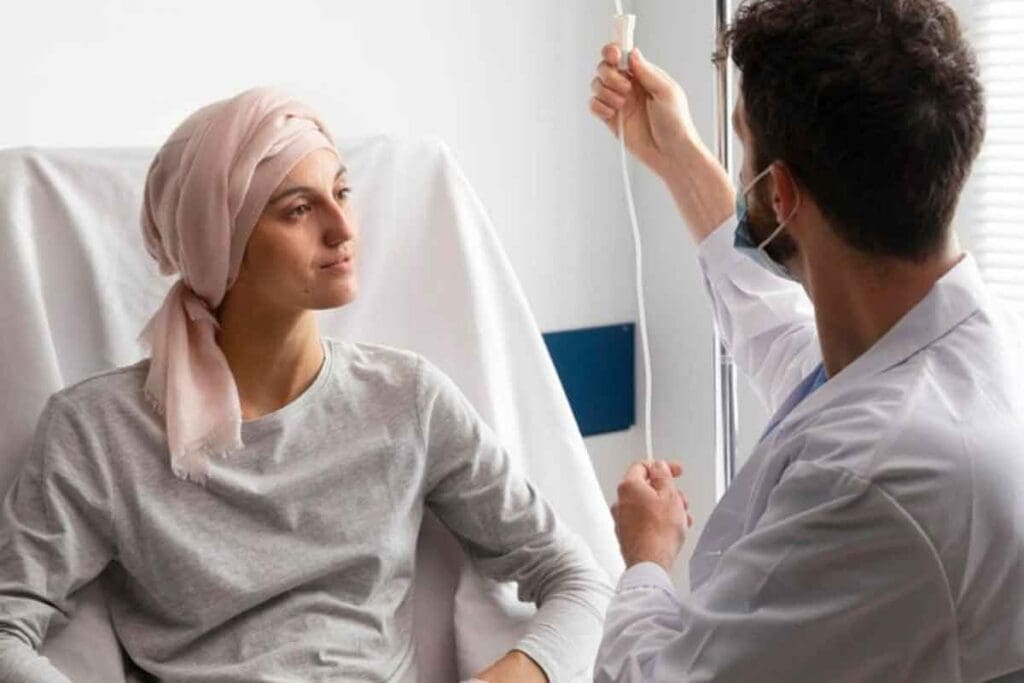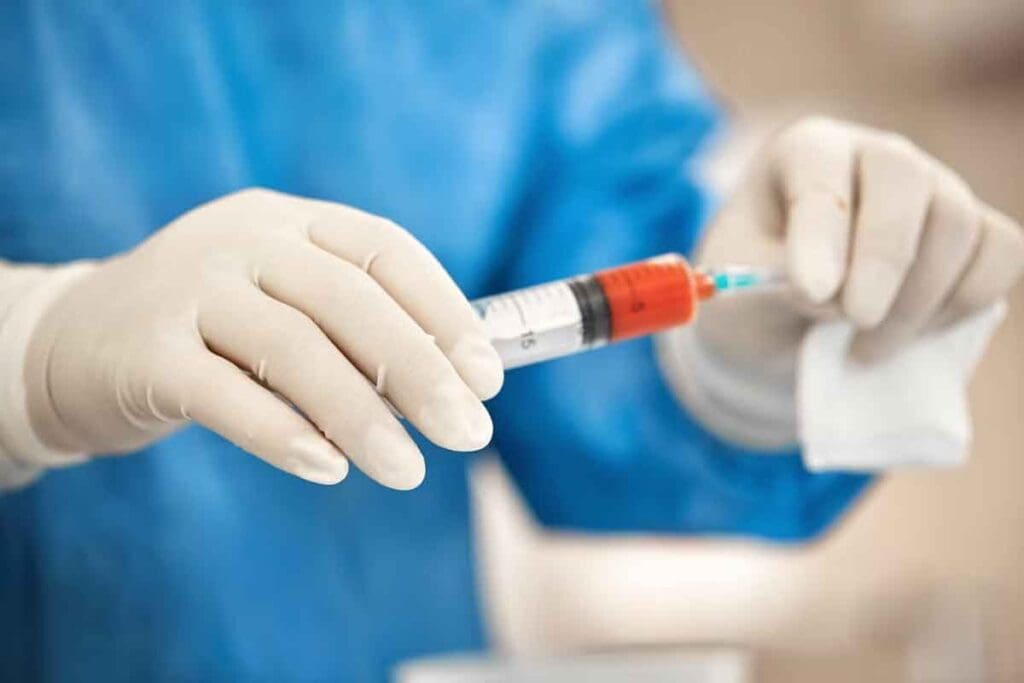Last Updated on November 17, 2025 by Ugurkan Demir

At the KU Transplant Center, we know that Bone Marrow Transplant (BMT) care for cancer is complex. Our team offers support and guidance every step of the way.
Studies show that hematopoietic cell transplantation (HCT) can save lives. It’s used for many diseases and continues to improve. The KU Transplant Center leads in BMT care cancer, offering complete support before, during, and after the transplant.

Understanding bone marrow transplantation is key for those considering it. It’s a treatment that replaces damaged bone marrow with healthy cells. This is vital for patients with certain cancers that harm the bone marrow’s blood-making ability.
Bone marrow is vital for making blood cells. Red blood cells carry oxygen, white blood cells fight infections, and platelets help blood clot. Without these, our health would suffer greatly.
Cancer can harm the bone marrow’s function. It can cause anemia, infections, and bleeding problems. For example, leukemia disrupts blood cell production. In these cases, bone marrow transplantation can help.
Cancer experts say BMT is a key treatment for many. It helps restore bone marrow function and promotes healthy blood cell production.

BMT care is a specialized field that helps cancer patients by replacing damaged bone marrow with healthy stem cells. These stem cells can come from the patient themselves or a donor. This process helps the body fight the disease better.
BMT is key in making sure patients have healthy blood cells. It gets rid of bad bone marrow and puts in new, healthy stem cells. This is very important for patients with cancers like leukemia or lymphoma.
The steps to BMT include:
BMT is needed for patients whose cancer doesn’t respond to usual treatments. It’s also for those with high-risk disease. It’s mainly for patients with blood cancers like AML or multiple myeloma.
“BMT offers a potentially curative treatment option for patients with certain types of cancer, providing a second chance at life.”
The main goals of BMT are to:
By reaching these goals, BMT care can greatly improve cancer patients’ chances of survival. It offers a chance for a cure and a better quality.
Autologous transplants use the patient’s own stem cells. These are collected, stored, and then reinfused after a conditioning regimen. This type of transplant is often used for patients with certain types of lymphoma or multiple myeloma.
One of the advantages of autologous transplants is that they eliminate the risk of graft-versus-host disease (GVHD). GVHD is a potentially serious complication associated with allogeneic transplants.
But autologous transplants may not be suitable for patients whose cancer has contaminated their bone marrow. They also may not be for those who require a graft-versus-tumor effect to eliminate residual cancer cells.
Allogeneic transplants use stem cells from a donor, typically a sibling or unrelated donor. This type of transplant is often recommended for patients with leukemia or other blood disorders. Allogeneic transplants offer the chance for a graft-versus-tumor effect, which can help eliminate cancer cells.
As one expert noted, “Allogeneic transplantation has revolutionized the treatment of certain hematologic malignancies. It offers a potentially curative option for patients who might not have other effective treatment choices.”
“The use of allogeneic transplantation has become a cornerstone in the management of various hematological disorders.”
Haploidentical transplants involve using stem cells from a family member who is only a half-match to the patient. This type of transplant is useful when a fully matched donor is not available. Cord blood transplants use stem cells collected from the umbilical cord and placenta after a baby is born.
BMT is a key treatment for some blood cancers. Knowing which cancers BMT can treat helps patients understand its role in their care.
Leukemia and lymphoma are common cancers treated with BMT. Leukemia affects the blood and bone marrow, causing abnormal white blood cells. Lymphoma is a cancer of the immune system’s lymphatic system. BMT is used for aggressive or treatment-resistant cases.
Leukemia and lymphoma have different subtypes, such as:
Multiple myeloma is a cancer of plasma cells in the bone marrow. It causes anemia, bone pain, and infections. BMT can restore healthy bone marrow and improve outcomes.
Other cancers may also be treated with BMT. These include:
Patients should talk to their healthcare provider about BMT for their specific cancer.
Understanding the BMT process is key for patients. It covers many stages from diagnosis to recovery. At our KU Transplant Center, we help our patients through every step. We make sure they get care that fits their needs.
The first step is a detailed evaluation to see if BMT is right for the patient. This includes medical tests and talks with our team. We look at the cancer type, health, and any other health issues.
After deciding BMT is a good option, we start pre-transplant conditioning. This step uses high-dose chemotherapy and/or radiation. It kills cancer cells and weakens the immune system. Our team watches over patients to handle side effects and keep them safe.
The transplant involves putting stem cells into the patient’s blood. This is a simple step that doesn’t need surgery. The stem cells then make new blood cells in the bone marrow. We use the latest tech to make sure the stem cells work well.
After the transplant, patients need close monitoring. We check their blood counts and health to see if the new cells are working. This is key to managing problems and helping the patient recover. Our team offers care like medicine, nutrition, and emotional support for a smooth recovery.
| Stage | Description | Key Considerations |
| Initial Evaluation | Thorough medical assessment to determine BMT candidacy | Medical history, cancer stage, overall health |
| Pre-Transplant Conditioning | High-dose chemotherapy and/or radiation therapy | Managing side effects, ensuring patient safety |
| Transplantation Procedure | Infusion of stem cells into the patient’s bloodstream | Stem cell processing, infusion technique |
| Post-Transplant Monitoring | Close monitoring of blood counts and overall health | Managing complications, supporting recovery |
Blood marrow transplant success rates have grown a lot. This is thanks to better medical tech and care. At our center, we aim to give top-notch care to our patients. We want the best results for those getting BMT.
The KU Transplant Center is known for its top-notch BMT care. It has a long history and many accreditations. We provide patients with detailed and caring treatment.
The KU Transplant Center is famous for its quality BMT care. We’ve earned many accreditations from top organizations. These show our dedication to patient care and research.
Our accreditations include:
Our team includes experts like hematologists, oncologists, and nurses. This team approach means we tailor care to each patient’s needs.
We also offer emotional support and guidance to patients and their families during the transplant process.
The KU Transplant Center has the latest technology and facilities. This lets us give our patients the best care possible. Our facilities include:
We’re always looking to improve BMT through research and innovation. Our center is part of many clinical trials and studies. These aim to better transplant outcomes and patient care.
By mixing research with our clinical work, we offer patients the newest treatments. This ensures they get the best care available.
Our team at KU Transplant Center is all about teamwork and expertise. We know that a team approach is key in BMT care. That’s why we have many healthcare professionals working together.
At the center of our team are hematologists and oncologists. They specialize in BMT oncology. They have a lot of experience with different cancers like leukemia and lymphoma.
They work with others to create treatment plans that fit each patient’s needs.
Our transplant coordinators and nurses are key in BMT care. They are the main contact for patients, guiding them through treatment. Their knowledge ensures patients get the best care, from start to finish.
Key responsibilities include:
We also have support specialists who are important in BMT care. Our dietitians help with nutrition plans. Psychologists and social workers offer emotional support and counseling.
Our team at KU Transplant Center works together to give top-notch BMT care and cancer services. We aim to provide the best care, using the latest in medical terms, BMT practices.
Our team at the KU Transplant Center is committed to top-notch pre-transplant care. This is key to a successful bone marrow transplant. We know the time before the transplant is vital for getting patients ready.
We do a detailed check-up on each patient before BMT. This helps us see if they’re healthy enough for the transplant. Our team of experts does a series of tests and talks with the patient.
Finding a good donor is key to allogeneic transplants. We use advanced HLA typing to find the best match for our patients.
Our donor matching process includes:
We tailor conditioning regimens to each patient’s needs. This considers their disease, health, and past treatments. Our aim is to kill the disease while keeping side effects low.
The conditioning process typically involves:
We think educating patients is essential for a good transplant outcome. Our team gives detailed info on the BMT process, possible side effects, and recovery.
We encourage patients and their families to ask questions. This way, they can fully understand and prepare for the transplant journey.
At the KU Transplant Center, we know that a bone marrow transplant is a big step. Our team is here to give you top-notch BMT medical care. We aim to treat your condition with the utmost care.
Our inpatient facilities are designed to be comfortable and supportive. We have rooms with the latest medical tech. This lets our team give you the best BMT cancer treatment.
Our nurses are always ready to help, day or night. They’re here for any concerns or needs you might have.
The day of your transplant is a big moment. Our team will help you through every step, from prep to the transplant itself. We know it can be scary, but we’re here to make it as easy as we can.
We focus on a safe and successful bone marrow transplant for bone cancer. We use the latest medical tech to help you.
We know family support is key during this time. Our center has resources and places for your family to stay. We want to make sure they can be with you.
We offer counseling and comfy waiting areas. Our goal is to make your stay as stress-free as possible.
At the KU Transplant Center, we care for both your medical and emotional needs. Our team works together to ensure the best results from your BMT.
Recovering after a transplant is a key part of the process. At the KU Transplant Center, we focus on post-transplant care. This helps ensure a good outcome and reduces risks.
Our team watches over patients closely after the transplant. We check their blood to see if the transplant is working. We also keep an eye on their health and manage any side effects.
Key aspects of monitoring include:
Even with the best care, problems can happen after a transplant. Our team is ready to handle these issues. We use advanced tools to find problems early and treat them right away.
Common complications include:
After a BMT, long-term care is key. Our plan includes regular check-ups and watching for late effects. We also help manage long-term side effects. This ensures patients can live healthy lives.
| Follow-Up Care | Description | Frequency |
| Initial Follow-Up | Close monitoring post-discharge | Weekly for the first month |
| Long-term Monitoring | Ongoing assessment of health and late effects | Quarterly for the first year, then annually |
As patients get better, we help them get back to their normal lives. We offer advice on nutrition, exercise, and daily activities. Our support team is here to answer any questions or concerns.
At the KU Transplant Center, we’re dedicated to caring for patients throughout their BMT journey. Our goal is to help every patient have a great outcome and a high quality of life after their transplant.
BMT is a life-saving treatment for many cancer patients. But it’s important to know the risks. This complex procedure can lead to several complications.
Graft-Versus-Host Disease (GVHD) is a big risk after allogeneic BMT. It happens when the donor’s immune cells attack the recipient’s body. GVHD can affect the skin, liver, and gut.
Managing GVHD is key to a successful transplant.
“GVHD is a major challenge in allogeneic BMT,” say top hematologists. It needs a team effort to manage, including medicines and supportive care.
Patients with BMT face a high risk of infections. This is because their immune system is weak. Preventing infections is vital in BMT care. This includes antibiotics, antivirals, and good hygiene.
BMT can cause long-term problems like organ damage and hormonal issues. It’s important to follow up to manage these issues.
| Side Effect | Management Strategy |
| Organ Dysfunction | Regular monitoring of organ function |
| Hormonal Imbalances | Hormone replacement therapy |
| Secondary Malignancies | Long-term surveillance |
At the U Transplant Center, we handle BMT complications in a detailed way. Our team works with patients to watch for risks and act fast. We focus on personalized care and the latest treatments for the best results.
“The key to successful BMT lies not only in the technical aspects of the procedure but also in the complete care before, during, and after the transplant.” |
The KU Transplant Center is leading the way in BMT care for cancer. We’re seeing big changes with new research and medical practices. These changes are making treatments more effective and focused.
The future of BMT looks bright, with new technologies and treatments on the horizon. Our team at the KU Transplant Center is always learning and growing. We make sure our patients get the best care possible.
We’re excited about the future of cancer treatment, with BMT playing a big role. Our goal is to keep improving and helping patients all over the world. We’re committed to excellence and can’t wait to see what’s next.
BMT care for cancer is a special treatment. It replaces damaged bone marrow with healthy stem cells. This helps the body fight cancer better.
Bone marrow makes blood cells,l ike red and white blood cells and platelets. Without it, we can get anemia, infections, and bleeding problems.
There are many types of bone marrow transplants. You can use your own stem cells or get them from a donor. There are also haploidentical and cord blood transplants.
BMT is great for treating cancers like leukemia, lymphoma, and multiple myeloma. These cancers often affect the bone marrow, making BMT a key treatment.
The BMT process is detailed and has many steps. It starts with checking the patient and finding a match. Then, there’s conditioning, the transplant, and watching how the body recovers.
The KU Transplant Center offers full care for BMT patients. This includes checking before the transplant, finding a match, making a plan for the transplant, and following up after.
BMT is very effective but can have risks like GVHD, infections, and long-term side effects. The KU Transplant Center works hard to manage these issues.
The KU Transplant Center has a team to handle GVHD. They use prevention, early detection, and treatment to manage it.
The KU Transplant Center offers many support services. This includes diet advice, mental health support, and help from social workers.
The success of bone marrow transplants depends on many things. These include the type of transplant, the disease, and the patient’s health. The KU Transplant Center has a good success rate.
To see if you’re a candidate for BMT, you need to check with a transplant center like the KU Transplant Center. They’ll look at your medical history, do tests, and talk to a specialist.
Medical News Today. Hemoglobin and red blood cells: Normal levels and disorders.
https://www.medicalnewstoday.com/articles/318050
PubMed Central. Hematopoiesis and red blood cell physiology.
Subscribe to our e-newsletter to stay informed about the latest innovations in the world of health and exclusive offers!